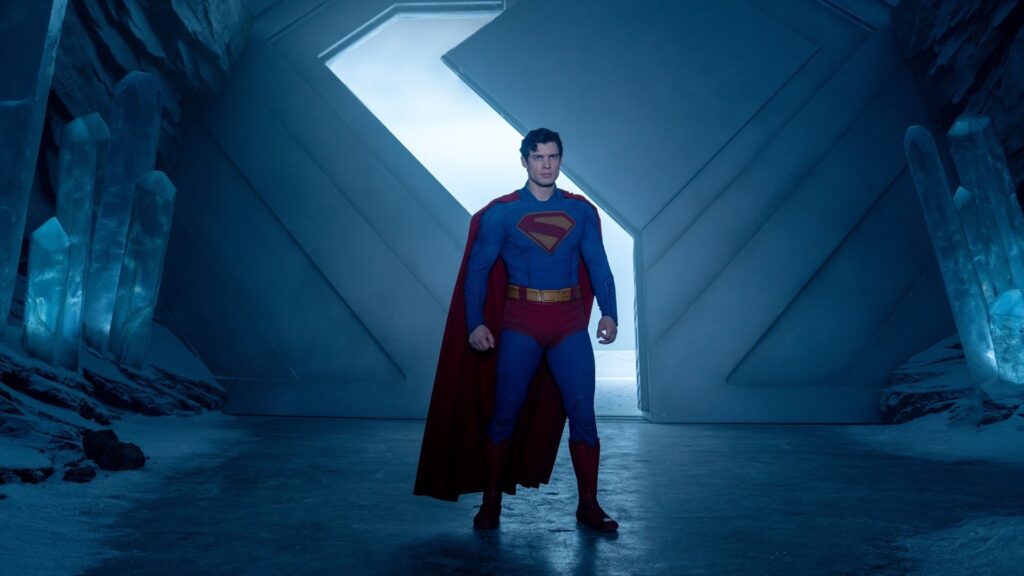

There’s a lot riding on James Gunn’s Superman, both as a reboot of DC’s movie universe and as the world’s reintroduction to the Man of Steel. It’s fitting, then, that its closest analog is Star Wars: The Force Awakens, Disney’s ambitious 2015 relaunch of a galaxy far, far away. Like The Force Awakens, Superman similarly leaves plot threads dangling in mid-air, but papers over its flaws by moving at a million miles an hour and centering a charismatic cast.
On one hand, Superman is big summer fun, with just enough laughs and action to get by. However, it also makes several lofty promises, by way of narrative and theme, that it doesn’t always keep. It’s a grand old time (until it isn’t). But its off-kilter visual approach is surprisingly effective, shaping the contours of a detailed, politically charged comic book universe that, for better or worse, never slows down.
More than anything, it’s a promise of something greater on the horizon. This is at once fitting for the tone of this new Superman — a folksy, optimistic Boy Scout, who is embodied by actor David Corenswet with aplomb — and a tremendous bummer for anyone hoping for this to be the next big landmark blockbuster à la The Avengers. For most viewers, it’ll likely be hard not to walk away with mixed emotions.
What is Superman about?

Credit: Warner Bros.
Few superhero films have so effectively captured the feeling of picking up a random issue of a long-running comic series and being dropped into the action in media res. It’s a novel, energetic approach to establishing a shared universe, and it begins with Superman crash-landing in the snow — battered and bloody — before being assisted, at his icy fortress, by polite droids he refers to as his “Superman robots.” With his chaotic superdog Krypto by his side, his animatronic helpers nurse this vulnerable version of the famous hero back to health and help him back in the saddle, as he resumes his battle against the Hammer of Boravia, an armored villain floating above Metropolis.
It’s quickly revealed that the Hammer is actually an entirely different villain in disguise — one secret identity hilariously concealing another — who answers to the genius business magnate Lex Luthor (Nicholas Hoult), amidst his scheme to destroy the Man of Steel. With these parameters swiftly established, Superman takes a beat to introduce us to its characters and world in a delightful fashion; this is one of the only times the movie takes a breather, allowing the music and production design to do the talking, as the world is slowly but surely fleshed out from the ground up. The score is electric at times — pun intended — though it’s most memorable when composers John Murphy and David Fleming aren’t charged with recreating John Williams’ motifs from 1978’s Superman: The Movie.
As Corenswet’s adorably awkward Clark Kent tries to figure out Luthor’s plan, his cautious interactions with strong-headed Daily Planet journalist Lois Lane (Rachel Brosnahan), and his playfulness with meek co-worker/best friend Jimmy Olsen (Skyler Gisondo) drop us right in the middle of pre-existing relationships, which go hand in hand with rapid-fire exposition. The fictitious, militarized nation of Boravia (a DC mainstay since 1939) has, with U.S. backing, been planning to invade the poor and ill-equipped country of Jarhanpur (a more recent comic addition). And Luthor appears to be somehow involved. Intentional or otherwise, this premise has unavoidable parallels to the ongoing Israel-Palestine conflict, as Superman’s role in the brouhaha — directly threatening the U.S.-allied Boravian president (Zlatko Burić) until he stands down — draws political and journalistic ire.
Superman is a politically charged summer blockbuster.

Credit: Warner Bros.
Lois, who acts standoffish with Clark at work but dates him in private (and knows his secret identity), challenges the Man of Steel on his tactics. This establishes a Superman who is, on one hand, politically ignorant, but on the other, so willing to do the right thing that geopolitical nuances are of no consequence to him — as long as it stops innocent people from getting hurt. However, Luthor’s plot is a lot more complicated (and more charged, from a real-world standpoint) than a single ground invasion. With permission from the U.S. government, the seething billionaire scientist has created an entire pocket dimension, in which he seeks to imprison political opponents — including Superman — on the grounds that the alien hero doesn’t deserve due process.
In an era where cruel holding facilities like Alligator Alcatraz have been dominating headlines, a story of dehumanizing and delegitimizing immigrants so they can be dropped into legal limbo with government backing is nothing if not politically urgent. It’s also the one idea on which Superman entirely follows up on, with the aforementioned pocket universe becoming the venue for an emotional wallop of a scene, as well as a delightfully strange action set-piece with its own unique physics, the likes of which no superhero movie has seen.
However, the more that Superman and his allies uncover Luthor’s plot — involving everything from giant kaiju to child endangerment and political false flags — the less his villainous plans seem to matter thematically. This serves largely as a conduit for mile-a-minute action with some (admittedly raucous) comedy beats. The film ends up overstuffed with super-powered supporting characters, to the point that Superman’s own ethical quandaries feel too easily resolved. In a subplot that sees the Man of Steel villainized in the public eye after being so beloved — thanks to a smart and surprising spin on his Kryptonian father Jor-El’s usual mission to have him lead us mere mortals — Superman is set up to reckon with the two halves of his identity: the human and the alien. But this conflict ends up nominal at best, with a conclusion (or lack thereof) that gives its aliens-as-immigrants metaphor some unsavory optics.
At the movie’s core lies a tale of internal dilemma over American identity in 2025, and the cruelty of nativism as enacted and permitted by government forces. However, actually accessing this story — rather than simply gesturing towards it — often proves too difficult for Gunn’s haphazard approach. Superman moves faster than a speeding bullet, hopping between plot points practically at light speed. Its disparate parts are just about held together by accomplished, thoughtful approaches to character and action, which keep the movie speeding along.
Superman looks and feels like a superhero movie should.

Credit: Warner Bros. Ent.
The film’s trailers have given several viewers pause, in particular, because of its wide-angle lenses that exaggerate movement, whipping through contorted space in disorienting ways. However, in context, this approach from Gunn and cinematographer Henry Braham ends up enormously impactful and assists in the movie’s frenetic feel. Unfortunately, there are a handful of shots with wonky CGI, but they’re kept to a minimum and are easy enough to ignore when things zip past the screen at lightspeed.
The action feels larger than life, and dazzlingly superhuman, especially when Superman’s rival vigilante team, the Justice Gang, gets involved: winged warrior Hawkgirl (Isabela Merced), cocky intergalactic protector the Green Lantern/Guy Gardner (Nathan Fillion), and cool-as-ice tech wiz Mister Terrific (Edi Gathegi), who’s likely to be your kid’s new favorite hero. While Hawkgirl, unfortunately, gets the short end of the stick, her compatriots arrive as fully formed pieces of a larger superhero puzzle whose surface we’ve only just begun to explore.
The human supporting characters are all functional too. Hoult ensures that deep-seated jealousy radiates off every order Luthor barks at his henchmen. Some of these even take the form of alphanumeric attack combinations yelled at his super-powered cronies, who he commands like some kind of evil chess mastermind trying to check-mate the Man of Steel. Brosnahan’s Lois, though she ends up with more of a plot purpose than an emotional one, has a real presence and gusto about her. And although Gisondo’s Olsen is saddled with hints of unfortunately unpleasant misogyny — it wouldn’t be a James Gunn comedy without some — he has an infectious enthusiasm.
David Corenswet soars as Superman.

Credit: Warner Bros.
At the center of it all is Corenswet, who veers between an “aw, shucks” folksiness and stern authority. You can trace his transformations between mild-mannered reporter and Man of Steel through his tone of voice alone, and while there’s much more Superman to be found — the film doesn’t spend nearly enough time on the Clark half of his life — it leaves you wanting more of him. That’s both a strength and a major flaw: The characters are well-rounded, but the movie eventually loses all sense of emotional arc in its final act. Even Superman’s established ethos, of befriending everyday people (including immigrants) and of searching for the kindest, most humane ways to deal with major threats, ends up tossed out the window in favor of verbose speeches and third-act theatrics with world-ending stakes.
In Superman, Gunn has created what may be the single most Silver Age comic book saga ever put to screen. It’s a goofy live-action cartoon in which the effects of Kryptonite are akin to a shellfish allergy, and in which bad guys get punched so hard their teeth bounce off the camera. Yet its story retains a deeply human core, framing Superman as not just a dog lover, but a man with the earnestness of a golden retriever.
However, the movie’s breakneck pace renders those human elements secondary once it’s all said and done. It has vital, meaningful themes surrounding what Superman’s allegiance to truth, justice, and “the American way” truly means in 2025, with a brash penchant for the political in a manner that most Hollywood blockbusters tend not to touch. But in the end, it rushes past these tenets of its story, in service of big-idea fireworks that make its creative ambitions feel a little too small.




